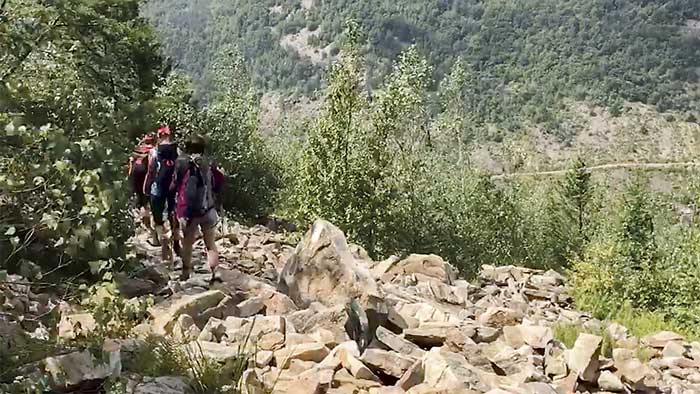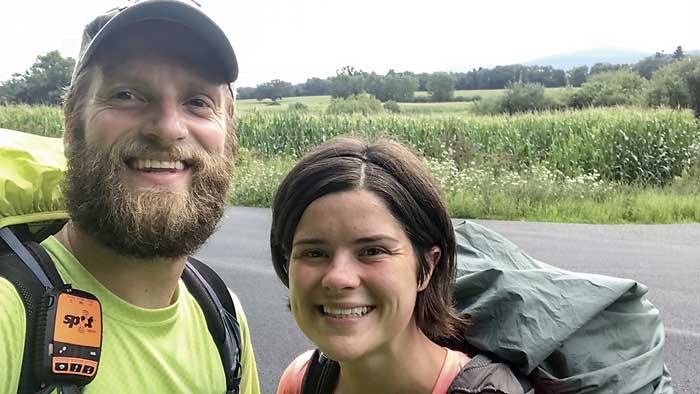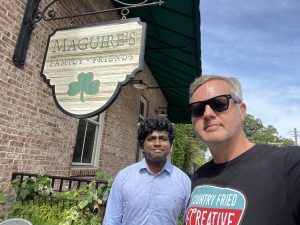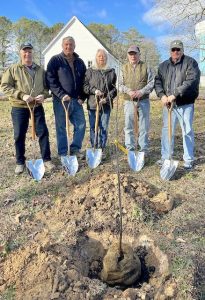The Casons hiked the Appalachian Trail Maine-to-Georgia to raise funds —
Maddie and Trey Cason just completed one giant adventure and are heading straight into another one.
The couple returned to Georgia in early November after a 2,190-mile trek along the Appalachian Trail. After taking a few weeks to enjoy the holidays and catch their breath, they will relocate to Thailand, where they will being working for an international humanitarian organization, Global Hope Network International.
Right now they are in Fayette County, where they grew up and where their families still live. They are graduates of McIntosh and Whitewater, and in recent years they have lived in the Atlanta area as Maddie spent the last four years as a math teacher while Trey worked with the homeless community and also for a consumer advocacy group.
It was the school calendar that dictated the direction of their hike, since Maddie was committed to finish out last year. They chose to start at the northern end of the trail in Maine, and that is what they did June 13. The trek concluded Nov. 10 in Georgia, almost five months later.
“Really it was the weather that made us start in Maine,” said Maddie. “As we came back down it would get warmer. The last two months it was still cold but nothing like what they’re getting in New Hampshire and Maine right now.”
Since it was their first time undertaking such an activity, there was no way to predict how long it would actually take. But they were satisfied with the outcome.
“We were shooting for average, which I think is 162 to 164 days. We went maybe slightly faster than average,” said Trey. “But going southbound you hit the hardest two states first — Maine and New Hampshire. They really beat us up because we didn’t have our trail legs yet and didn’t know what we were doing.”
The duo started out going 10-12 miles per day but later worked up to 17-22 miles per day. Most days they were up by 6:30, on the trail by 8 a.m. and walking until 6 p.m.
Having Maine and New Hampshire in their rear view was a “mental boost,” as Maddie put it, because they knew there would be nothing any more difficult than that the rest of the way. But the mental aspect of the hike is every bit as tough as the physical.
“It’s definitely a challenge,” said Trey. “It’s a wonderful experience but not an easy one.”
The couple prepared as much as possible, staying active and getting advice from friends who had done it before. “You can stay physically fit and try to get ready, but nothing really prepares you for actually doing it,” he said.
They accepted their new positions with GHNI just before the hike, deciding to combine a bucket-list item with a GHNI fundraiser. They brought in more than $11,000 from people who sponsored them on the hike, along with the satisfaction of completing a journey that about 4,000 people start each year and only 20 percent or so finish.
They had learned about GHNI from someone who had worked in Asia and was familiar with the organization. GHNI specializes in what it calls “transformational community development,” working with locals to assist them in improving their own quality of life in key areas such as health and wellness, income generation, food, water, and education.
“We were really impressed with their model of doing development abroad,” said Trey. “It’s dignifying and it starts from a place of believing a village has the capacity to do it.”
The amount of money raised on the Casons’ hike could fund GHIN’s work in a village for an entire year. Because of the emphasis on working with locals and sourcing materials locally, the work is typically done for about one-third of industry standard costs.
The couple will live in Thailand while doing most of their work in surrounding countries. Their main responsibilities will include consulting with local people and working together to come up with solutions to help the places that are affected. Using this model they could be working simultaneously with people in 5-10 villages in a handful of countries.
For more information on GHNI, visit www.globalhopenetwork.org.














Leave a Comment
You must be logged in to post a comment.